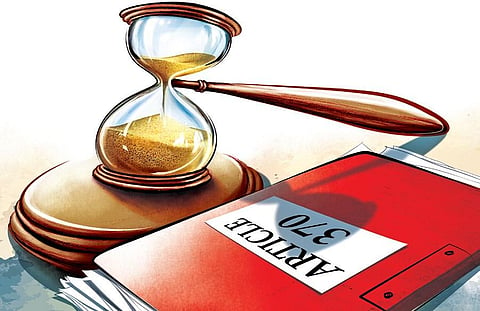

The Supreme Court's hearings on the constitutional validity of the abrogation of Article 370 began on August 2. At that time, it was worrying to think of just how much was at stake. Was the future of India on the line? If the Constitutional Bench struck down the abrogation, what would happen to the Republic, not to mention Narendra Modi's government?
Kashmir has long been seen as India's Achilles' heel. A disputed territory, which our enemy across the border tried to invade soon after accession, with Pakistan capturing and still occupying one-third of the area: Kashmir's status unresolved in the United Nations; cross-border terrorism aided by local radical Islamists killing or driving out the last remnants of the Kashmiri Pandit Hindu minority in the 1990s; subsequent unrest, stone-pelting, and targeted violence continuing under ineffective local parties' and President's rule; attempts made to change the demographics of the Hindu-majority Jammu by settling indigenous nomadic tribal groups and foreign refugees such as the Muslim Rohingyas; these are some of the snapshots well entrenched in the consciousness not only of the political class but the ordinary citizens of the country.
The abrogation of the notorious article 370, with its even more iniquitous sub-clause 35A, protesting against which Shyama Prasad Mukherjee died in Srinagar, was to be challenged by a battery of India's ablest lawyers, led by none other than former cabinet minister and Congressman, Kapil Sibal. These eminent legal luminaries, who charged, at times, crores for a single day's appearance in court, all fighting the abrogation of 370 pro bono—or free of cost! For whom? The likes of Mohammad Akbar Lone, who brazenly screamed "Pakistan Zindabad” slogans in the J&K Assembly in 2018! The strange derangement of some of India's best legal brains coming out in support of those who, evidently, did not believe in the Indian Constitution and habitually perjured themselves in promoting separatism despite swearing to uphold India's territorial unity and integrity was hard to comprehend.
But listening to the hearings, telecast live to the nation, one felt much more reassured. From the very beginning, the calm demeanour of the Constitutional Bench, especially of the honourable Chief Justice, D Y Chandrachud, the searching and intelligent questions posed to the learned counsel arguing against the abrogation, and, more recently, the counter-arguments by the Solicitor General, Attorney General, and others appearing on the government side—all this has been very encouraging. The Constitutional Bench was not bamboozled or confused by the sophistry, if not trickery, of those spewing what some would dismiss as faff or hair-splitting casuistry passing off as legal brilliance.
It is impossible to summarise in one column the arguments or even go into the legal intricacies of the sixteen-day-long hearings. But they establish beyond a doubt that what some have dubbed, perhaps uncharitably, as the "Gupkar gang of Bharat Todo advocates" was given complete latitude to make their case. Never mind the amount of precious time expended by the highest court of the land. Because the whole world has now seen that due process was offered and followed to the fullest extent of the law. Somewhere, deep down in their hearts, the "Milords" must also have known that they were also on trial at the bar of history. They simply could not afford to fail the Republic.
Why do I say this? Because, at its most basic, the primary purpose of the Constitution, which willed our Republic into existence in 1950, is to protect and safeguard it, not to preside over its break-up. Those very democratic values that the opponents of the abrogation were claiming to uphold were threatened by the invasion of Pakistan army-backed tribal militia and, later, by cross-border terrorism. What about the democratic rights of the Kashmiri Pandits driven out of the millennia-old homeland? Didn't the erstwhile Constitution of J&K fail to protect their lives or property? Of what use, then, was that Constitution already overrun by terrorism and separatism? Or the very real threat to democracy of radicalised Islamists using the gun to impose their writ on the land? Why didn't these same advocates speak up at that time?
But let us, for a moment, stick to the legal and constitutional—when the Republic and its Constitution are themselves dynamic, how could 370 be fixed and eternal, never subject to change or abrogation? If 370 was a temporary provision, its unchangeability seems a spurious argument. So what if the Constituent Assembly of the former J&K was dissolved? Does that mean that the very power to make alterations evaporated into nothingness? The power to change, dilute, or end 370 had to vest somewhere. The question is precisely where. Well, again, the commonsensical answer is rather simple. The power vested with the President of India. It is that power, upon the recommendation of the central legislature, in the absence of both a state assembly, which was exercised.
Common sense, as they say, is rather rare, especially when conflicting political interests are at stake. It is, therefore, heartening to see that the apex court, in addition to legal acumen and wisdom, also displayed common sense in ample measure. Thankfully, patriotism, too. It is very easy to criticise our judges or to claim that our legal system does not work. But the job of the CJI and his small team of Supreme Court judges is immensely onerous. They must read, digest, cogitate, prepare, and pronounce verdicts on complex matters of crucial importance day after day, all in the constant glare of public attention and scrutiny. Despite all the flak it continues to receive, our judiciary, at the end, is something to be proud of. It rises to the occasion when needed, restoring our faith not only in democracy but the Republic itself.
Listening to the proceedings, which concluded on September 5, we might expect that not only justice but good sense and national interest will prevail. As for now, the Constitution Bench's judgement on 370 remains reserved.
(Views are personal)
Makarand R Paranjape
Professor of English at JNU
(Tweets @MakrandParanspe)